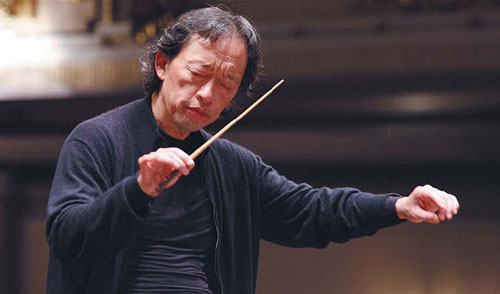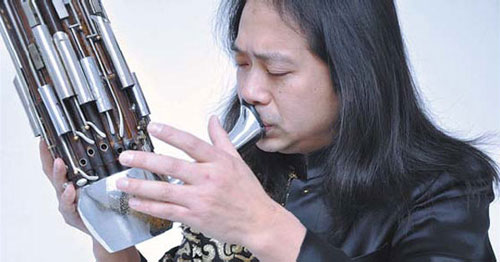

Conductor Myung-whun Chung (top) and sheng soloist Wu Wei (above) cooperate to perform the Chinese premiere of composer Unsuk Chin's concerto, Su, in Beijing. Photos Provided to China Daily
Seoul and Beijing celebrate 20 years as sister cities with the Seoul Philharmonic Orchestra performing a piece written for a traditional Chinese instrument, sheng. Chen Nan reports.
A concert celebrating the 20th anniversary of ties between Beijing and Seoul, saw the Seoul Philharmonic Orchestra, under conductor Myung-whun Chung, performing composer Unsuk Chin's concerto, Su, at the National Center for the Performing Arts. The piece was initially written for the traditional Chinese instrument sheng.
Verdi's La forza del destino Overture and Beethoven's Symphony No 5 were also performed at the concert titled, Gift From Seoul to Beijing.
Performed by Wu Wei, the world's leading avant-garde sheng soloist who is based in Berlin, the concerto is very meaningful to the composer.
"I've always wanted the concerto to be performed in China," says Chin in Beijing. "There are not many Western classical works written for an Eastern instrument. It certainly helps the soloist to perform the instrument on an international stage."
Chin and Wu met in Berlin six years ago at a mutual friend's wedding. Wu played the sheng at the wedding, which impressed Chin. Since then the two have wanted to work together.
"Sheng is a very interesting instrument, which can fully express my musical ideas," says Chin.
The Berlin-based composer is best known for her award-winning Violin Concerto, in 2002, and her first opera Alice in Wonderland in 2007.
Five years ago, she was invited by Chung to be the Seoul Philharmonic Orchestra's composer-in-residence. In 2014, the two will release a new album including the concerto for sheng, a mouth-blown free-reed instrument consisting of vertical pipes.
"Music is a bridge between different cultures. There's only one goal for a musician - convey the greatness of music to the audience," says 60-year-old Chung, who is also a pianist.
Chung initially shot to international fame in 1974 when he won second place at the International Tchaikovsky Competition.
"I'm a one-track man and I just focus on music. All cultures are beautiful and interesting. This music has existed for hundreds of years and is still evolving," he says.
Chung has been the art director and principal conductor of the Seoul Philharmonic Orchestra since 2005, and says he has seen great progress from the orchestra and increased awareness from audiences.
"The starting point and the end point are the same - the quality of music," says the conductor.
"Like China itself, classical music has developed greatly. When I joined the orchestra seven years ago it was rare for people to buy tickets, despite the low price. But now our concerts are sold out, though the ticket prices are much higher. Audiences see it's worthwhile to pay for concerts."
With Chung as the driving force, the Seoul Philharmonic Orchestra signed an exclusive recording contract with Deutsche Grammophon, which has taken the orchestra to an international audience.
"Again, like in China, although we have top level soloists playing on the international stage, it's very hard for an orchestra to reach the top level. It's clear when you see the number of young people studying music in China today," he says. "The traditional idea in Asia is to have good skilled soloists rather than developing chamber music or orchestras."
When he came to the orchestra, which is South Korea's oldest, founded in 1948, he insisted on improving the facilities of the orchestra first, from food to chairs.
"If the musicians' chairs are poor, they are not given the proper respect," he says. "I often joke with my musicians, saying they should look forward to the day I retire. When I retire, I will make food for them."
As the sixth of seven children, Chung jokes that he listened to his brothers and sisters playing piano and violin before he was born.
He and his sisters, violinist Kyung-wha Chung and cellist Myung-wha Chung, used to perform together as the Chung Trio.
"I accompanied my sister when I began studying piano so I am not only a leader in an orchestra but also a good accompanist," he says.
Now, together with Chin, Chung says he has two main responsibilities with the orchestra: bringing in great soloists and helping the young musicians.
Shi-Yeon Sung, 33, is the associate conductor of the Seoul Philharmonic Orchestra, and is considered "one of the most exciting young conductors on the international scene" by Chung.
"Chung doesn't teach me much about technique but tells me about his musical ideas, which is very inspiring," says Sung, who made her formal conducting debut in 2002, conducting Die Zauberflote in Berlin.
The annual Arts Nova series of public events, which highlight contemporary experimentation in classical music under Chin, give audiences a closer look at music.
"There are many young talents who deserve a chance to emerge from the background," Chin says.
"For musicians, we are always trying to help people through music," says Chung, referring to both public music educational events and charity events, such as helping in the aftermath of the Wenchuan earthquake in 2008. When the Japan tsunami happened in 2011, he led the orchestra to perform there.
Contact the writer at chennan@chinadaily.com.cn.
